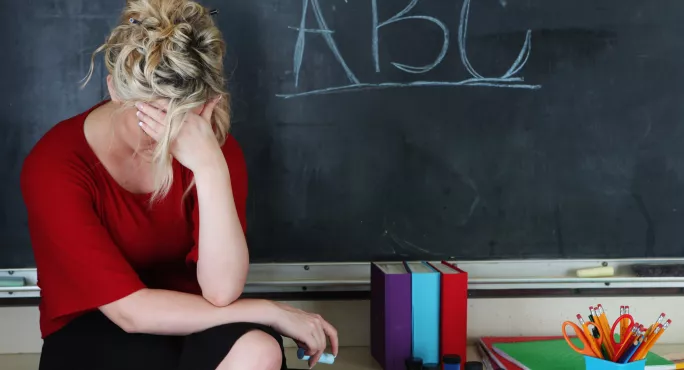- Home
- Does teachers’ altruism create an unbearable burden?
Does teachers’ altruism create an unbearable burden?

People who enter the teaching profession, whether at the tender age of 17 or at a more mature stage in life, are motivated by a strong drive to make a difference. However, when faced with young people experiencing difficulties with their mental health, around 70 per cent of teachers, when asked, feel poorly equipped to respond (see references below).
Upon starting their school placements, student teachers find themselves managing a multitude of relationships: relationships with mentors, class teachers, parents and children. And the student teacher will not be unchanged by the emotional impact of these relationships, as Nathalie Downing captured in a recent Tes article.
During school placements, some student teachers face several crises, both within themselves and in responding to the mental health of the children in their care. “Maybe teaching is not for me?” is often the first internal question that students ask.
Quick read: ‘Struggling’ teachers need more mental health support
News editor’s take: Teaching offers a richness that few professions can match
Teacher wellbeing: Why don’t schools offer staff supervision?
The Place2Think pilot project I am involved in, then, has provided a confidential space where they can be helped to reflect on their experience and increase their resilience.
Protecting student teachers’ wellbeing
Teacher resilience has been written about widely, and, as with children’s resilience, it is not an innate quality but one that needs to be learned. The availability of an external source of support can be helpful in promoting this growth and resilience.
By partnering with a third-sector organisation in Place2Be, a children’s mental health charity, the universities of Stirling and Edinburgh have been able to use the complementary skills of a Place2Be clinician to offer this external support.
Place2Think is a one-to-one reflective session, a confidential space to allow discussion around emotional reactions, responses, attitudes and beliefs. These conversations help the student teacher to grow, and to understand and embrace the challenges of their chosen profession.
Our first evaluation of the project shows that, although there was some evidence of Place2Think having a use as a therapeutic space, there was an over-riding focus on practice. Participants described how it helped them to modify their own behaviour, both within the classroom and elsewhere in their lives.
One student teacher said: “I’ve enjoyed having a place to go to talk about the things that are in my head and also to have somebody that can understand what I was thinking without fear of judgment.”
Another said that, without this space to “unpack the baggage” they had accumulated in their short time in teaching, they would have “given into my insecurities” and left the profession.
This is a project which, crucially, allows new teachers to understand their own behaviour, develop a sense of agency and to be truly reflective about their actions. Fundamentally, they feel valued and supported. And could offering teachers the opportunity to truly face themselves, like these student teachers, help reverse the current crisis which sees many teachers walk away from their profession?
The charity Barnardo’s Scotland, like Place2Be, wants to have a national conversation regarding this type of teacher support. We believe all teachers would benefit from what is referred to as “reflective supervision”, helping teachers to survive a stressful profession and also promote teaching as an attractive and sustainable profession.
We know teachers want to make a difference - but we need to provide the right support to let them do this.
Kathleen Forbes is a clinician at children’s mental health charity Place2Be, and currently works in initial teacher education at the University of Stirling
References:
- “70% of Scotland’s teachers lack training to address mental health problems in schools”. Scottish Mental health Foundation, 10 December 2018
- Nias, J (1996). “Thinking about Feeling: the emotions in teaching”, Cambridge Journal of Education, 26:3, 293-306.
- Downing, N. ”Wellbeing: Why don’t schools offer staff supervision?” Tes, 27 June 2019.
- Qing Gu (2014) “The role of relational resilience in teachers’ career-long commitment and effectiveness”, Teachers and Teaching, 20:5, 502-529.
- “Supporting the mental health and wellbeing of education staff through professional supervision structures.” Trauma-Informed Schools Discussion Paper, June 2019.
Keep reading for just £1 per month
You've reached your limit of free articles this month. Subscribe for £1 per month for three months and get:
- Unlimited access to all Tes magazine content
- Exclusive subscriber-only stories
- Award-winning email newsletters

